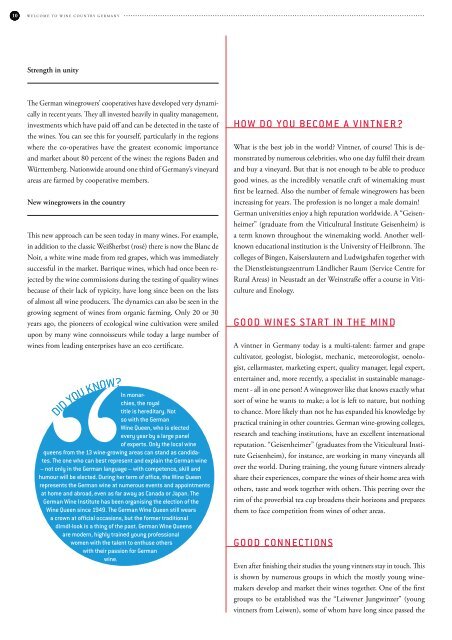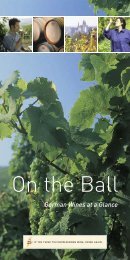the magazine of the german wine institute - Wines of Germany
the magazine of the german wine institute - Wines of Germany
the magazine of the german wine institute - Wines of Germany
You also want an ePaper? Increase the reach of your titles
YUMPU automatically turns print PDFs into web optimized ePapers that Google loves.
35 10<br />
WELCOME TO WINE COUNTRY GERMANY<br />
Strength in unity<br />
The German <strong>wine</strong>growers’ cooperatives have developed very dynami-<br />
cally in recent years. They all invested heavily in quality management,<br />
investments which have paid <strong>of</strong>f and can be detected in <strong>the</strong> taste <strong>of</strong><br />
<strong>the</strong> <strong>wine</strong>s. You can see this for yourself, particularly in <strong>the</strong> regions<br />
where <strong>the</strong> co-operatives have <strong>the</strong> greatest economic importance<br />
and market about 80 percent <strong>of</strong> <strong>the</strong> <strong>wine</strong>s: <strong>the</strong> regions Baden and<br />
Württemberg. Nationwide around one third <strong>of</strong> <strong>Germany</strong>’s vineyard<br />
areas are farmed by cooperative members.<br />
New <strong>wine</strong>growers in <strong>the</strong> country<br />
This new approach can be seen today in many <strong>wine</strong>s. For example,<br />
in addition to <strong>the</strong> classic Weißherbst (rosé) <strong>the</strong>re is now <strong>the</strong> Blanc de<br />
Noir, a white <strong>wine</strong> made from red grapes, which was immediately<br />
successful in <strong>the</strong> market. Barrique <strong>wine</strong>s, which had once been rejected<br />
by <strong>the</strong> <strong>wine</strong> commissions during <strong>the</strong> testing <strong>of</strong> quality <strong>wine</strong>s<br />
because <strong>of</strong> <strong>the</strong>ir lack <strong>of</strong> typicity, have long since been on <strong>the</strong> lists<br />
<strong>of</strong> almost all <strong>wine</strong> producers. The dynamics can also be seen in <strong>the</strong><br />
growing segment <strong>of</strong> <strong>wine</strong>s from organic farming. Only 20 or 30<br />
years ago, <strong>the</strong> pioneers <strong>of</strong> ecological <strong>wine</strong> cultivation were smiled<br />
upon by many <strong>wine</strong> connoisseurs while today a large number <strong>of</strong><br />
<strong>wine</strong>s from leading enterprises have an eco certificate.<br />
chies, <strong>the</strong> royal<br />
title is hereditary. Not<br />
so with <strong>the</strong> German<br />
Wine Queen, who is elected<br />
every year by a large panel<br />
<strong>of</strong> experts. Only <strong>the</strong> local <strong>wine</strong><br />
queens from <strong>the</strong> 13 <strong>wine</strong>-growing areas can stand as candidates.<br />
The one who can best represent and explain <strong>the</strong> German <strong>wine</strong><br />
– not only in <strong>the</strong> German language – with competence, skill and<br />
humour will be elected. During her term <strong>of</strong> <strong>of</strong>fice, <strong>the</strong> Wine Queen<br />
represents <strong>the</strong> German <strong>wine</strong> at numerous events and appointments<br />
at home and abroad, even as far away as Canada or Japan. The<br />
German Wine Institute has been organising <strong>the</strong> election <strong>of</strong> <strong>the</strong><br />
Wine Queen since 1949. The German Wine Queen still wears<br />
a crown at <strong>of</strong>ficial occasions, but <strong>the</strong> former traditional<br />
dirndl-look is a thing <strong>of</strong> <strong>the</strong> past. German Wine Queens<br />
are modern, highly trained young pr<strong>of</strong>essional<br />
women with <strong>the</strong> talent to enthuse o<strong>the</strong>rs<br />
with <strong>the</strong>ir passion for German<br />
<strong>wine</strong>.<br />
DID YOU KNOW? In monar-<br />
HOW DO YOU BECOME A VINTNER?<br />
What is <strong>the</strong> best job in <strong>the</strong> world? Vintner, <strong>of</strong> course! This is demonstrated<br />
by numerous celebrities, who one day fulfil <strong>the</strong>ir dream<br />
and buy a vineyard. But that is not enough to be able to produce<br />
good <strong>wine</strong>s, as <strong>the</strong> incredibly versatile craft <strong>of</strong> <strong>wine</strong>making must<br />
first be learned. Also <strong>the</strong> number <strong>of</strong> female <strong>wine</strong>growers has been<br />
increasing for years. The pr<strong>of</strong>ession is no longer a male domain!<br />
German universities enjoy a high reputation worldwide. A “Geisenheimer”<br />
(graduate from <strong>the</strong> Viticultural Institute Geisenheim) is<br />
a term known throughout <strong>the</strong> <strong>wine</strong>making world. Ano<strong>the</strong>r wellknown<br />
educational institution is <strong>the</strong> University <strong>of</strong> Heilbronn. The<br />
colleges <strong>of</strong> Bingen, Kaiserslautern and Ludwigshafen toge<strong>the</strong>r with<br />
<strong>the</strong> Dienstleistungszentrum Ländlicher Raum (Service Centre for<br />
Rural Areas) in Neustadt an der Weinstraße <strong>of</strong>fer a course in Viticulture<br />
and Enology.<br />
GOOD WINES START IN THE MIND<br />
A vintner in <strong>Germany</strong> today is a multi-talent: farmer and grape<br />
cultivator, geologist, biologist, mechanic, meteorologist, oenologist,<br />
cellarmaster, marketing expert, quality manager, legal expert,<br />
entertainer and, more recently, a specialist in sustainable management<br />
- all in one person! A <strong>wine</strong>grower like that knows exactly what<br />
sort <strong>of</strong> <strong>wine</strong> he wants to make; a lot is left to nature, but nothing<br />
to chance. More likely than not he has expanded his knowledge by<br />
practical training in o<strong>the</strong>r countries. German <strong>wine</strong>-growing colleges,<br />
research and teaching institutions, have an excellent international<br />
reputation. “Geisenheimer” (graduates from <strong>the</strong> Viticultural Institute<br />
Geisenheim), for instance, are working in many vineyards all<br />
over <strong>the</strong> world. During training, <strong>the</strong> young future vintners already<br />
share <strong>the</strong>ir experiences, compare <strong>the</strong> <strong>wine</strong>s <strong>of</strong> <strong>the</strong>ir home area with<br />
o<strong>the</strong>rs, taste and work toge<strong>the</strong>r with o<strong>the</strong>rs. This peering over <strong>the</strong><br />
rim <strong>of</strong> <strong>the</strong> proverbial tea cup broadens <strong>the</strong>ir horizons and prepares<br />
<strong>the</strong>m to face competition from <strong>wine</strong>s <strong>of</strong> o<strong>the</strong>r areas.<br />
GOOD CONNECTIONS<br />
Even after finishing <strong>the</strong>ir studies <strong>the</strong> young vintners stay in touch. This<br />
is shown by numerous groups in which <strong>the</strong> mostly young <strong>wine</strong>makers<br />
develop and market <strong>the</strong>ir <strong>wine</strong>s toge<strong>the</strong>r. One <strong>of</strong> <strong>the</strong> first<br />
groups to be established was <strong>the</strong> “Leiwener Jungwinzer” (young<br />
vintners from Leiwen), some <strong>of</strong> whom have long since passed <strong>the</strong>



